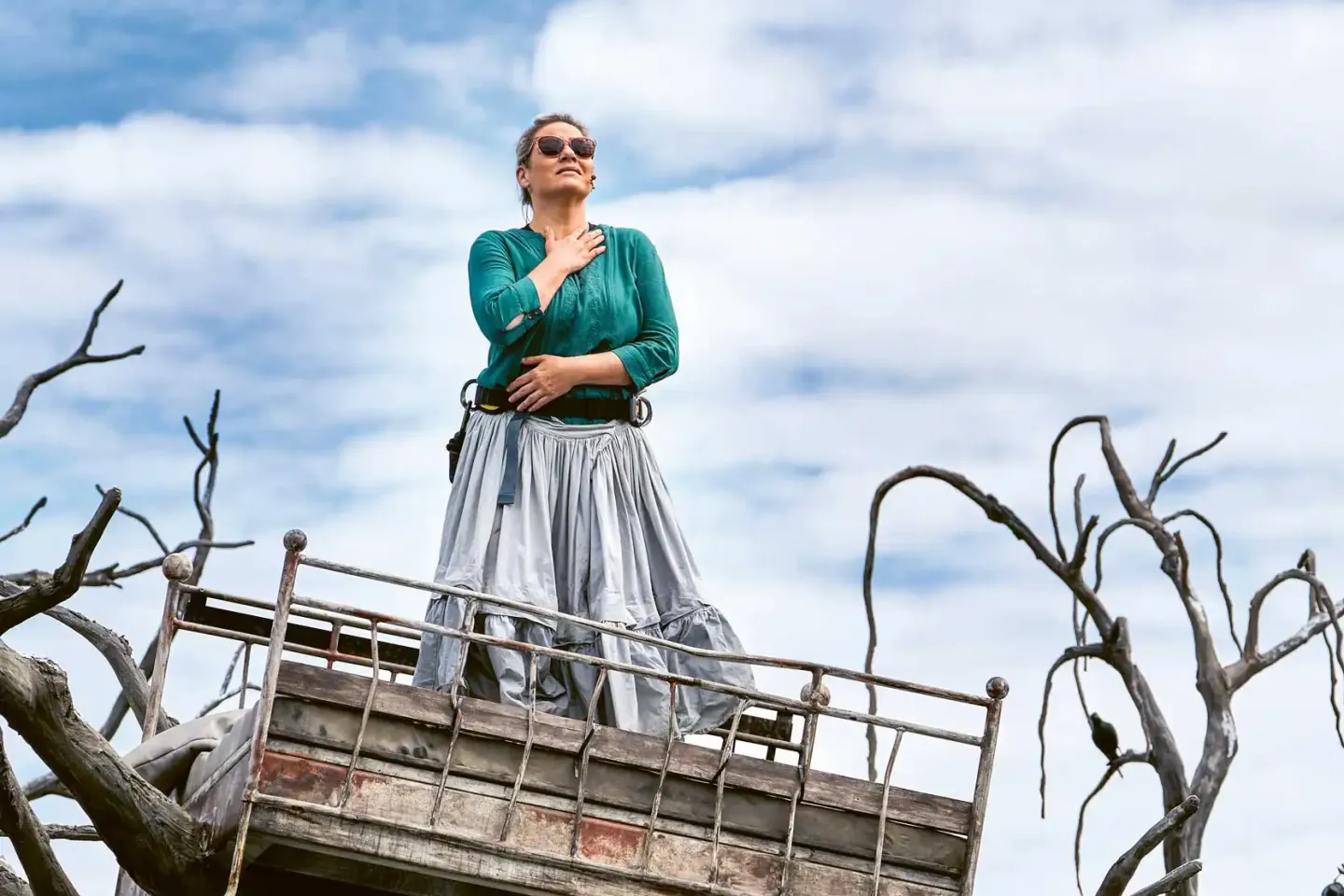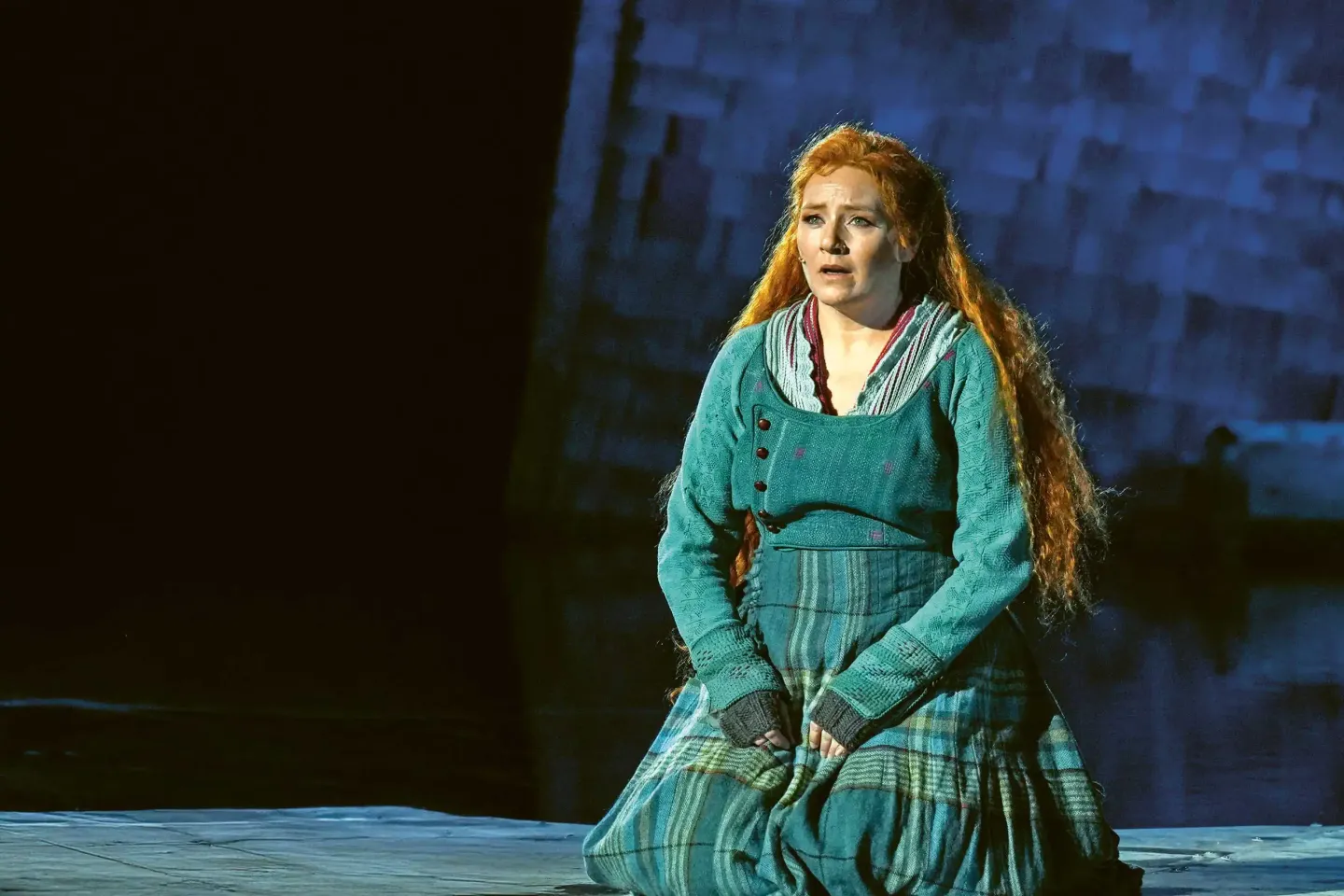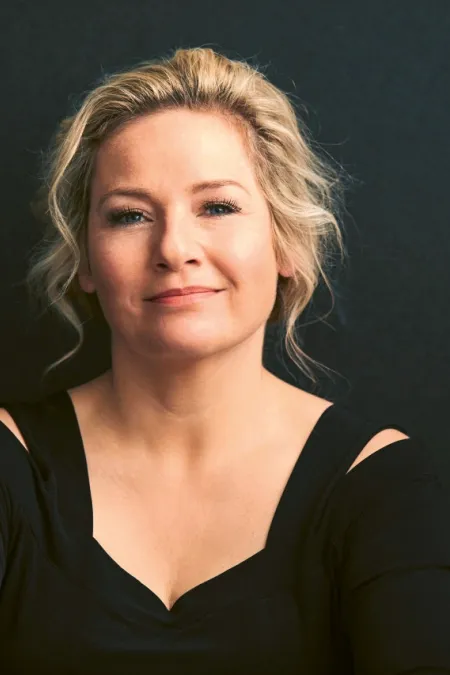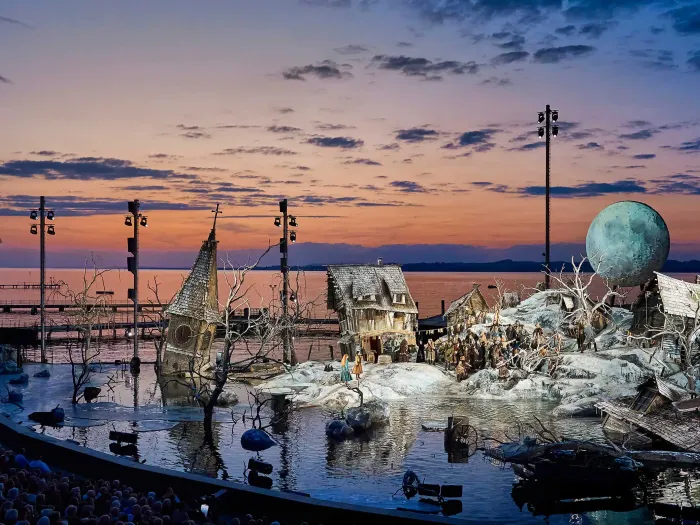The interview was held by Thea Plath.
The text was published in edition 3 (06/25).
Reading time 5 Min.
“I’ve never experienced this in an opera house before”
When a soprano wades through water and enjoys seeing spiders on stage, it can only be at the Bregenzer Seebühne: Last summer, Mandy Fredrich made her debut as Agathe on the grand open-air stage – in 2025, she returns. An interview about challenging rehearsals, her favorite moments in the production, and how a role evolves with each performance.

Securely perched in Agathe’s ‘floating bed’: Mandy Fredrich during rehearsals.
The Bregenzer Festspiele look back on a highly successful summer in 2024. It was your first season on the Seebühne, after having appeared twice in the Opera at the Festspielhaus – in 2017 for Gioachino Rossini’s Mosè in Egitto and two years prior in Jacques Offenbach’s The Tales of Hoffmann. How does working on the Seebühne differ from singing in the Opera at the Festspielhaus?
Mandy Fredrich: The difference is significant. The venues are completely differet, especially the Seebühne, which is much larger. You move more, and that requires a completely different type of activity. As Agathe, I have long, serene phrases that require sustained breath – and doing this while stepping onto a bed, wading across water, and finding your way down a hill is… challenging. The unpredictable weather adds to the complexity. A personal highlight is the presence of animals on stage, especially the spiders, which sometimes give me a little fright. I've never experienced that in an opera house.
The Seebühne is unique in musical terms as well. The ensemble communicates with the musical director exclusively via monitors, and the orchestra is transmitted to the stage through speakers. Unlike in an opera house, singers also perform with microphones. How do you adapt to these conditions?
It is truly a significant adjustment, as you lose the acoustics of an enclosed space and must adapt to hearing your own voice exceptionally through speakers. In university we learn to project the voice into the room – which is missing on the Seebühne. You must trust that what you intend to “send out” will be conveyed through the microphone. The timing with the orchestra also takes getting used to, as there is a slight delay between the video monitors and the acoustic monitors. But we’re getting better with each performance.

With its 680 square meters of hilly landscapes and a water basin holding the equivalent of 3,200 bathtubs, the Seebühne delivers extraordinary moments for its singers every summer.
Having performed as Agathe at the Stuttgart State Opera, what is especially intriguing for you about Philipp Stölzl’s interpretation of this character?
I find Agathe’s vibrancy beautiful. She is a spirited woman, prone to worry, yet far removed from passivity and piety. She actively chooses her path. The dynamics with Ännchen are interesting as well. The nature of their bond. Whether she falls in love with Ännchen or not and the final scene can be interpreted differently by every singer who takes on the role, making it a character that grows and reshapes itself with each performance. You always discover new approaches and possible interpretations.
What is your favorite scene in this production?
I always look forward to the scene where we stumble out of the tavern, tipsy, and carefree, making our way across the stage. My musical highlights come in other moments – like the aria performed on the ‘floating bed’ – they do bring me joy of course – but the tavern scene captures Agathe’s joy and carefree nature, making it a special moment for me.
What inspired you to return to Bregenz for another summer?
I have a deep affection for the Bregenzer Festspiele and am always happy to return – not only for the beautiful surroundings and ideal work–life balance, but also for the chance to have my family with me for a time. Most of all, I am eager to see how this second year will evolve and where Philipp Stölzl may adjust the staging. This workshop-like quality of the production excites me.

At the start of rehearsals, you primarily worked with Jan Dvořák’s new dialog version. How do you feel about this unique mixture of text and music in the Bregenzer Freischütz?
The dialogues invite more nuance from us as singers – this is where you notice the biggest difference between the casts, making the characters feel more contemporary and approachable. This evokes different reactions from the audience; the dialogues give us a chance to shape and present our roles with more freedom.
Der Freischütz returns for 27 performances with three alternating casts. How do you work with so many colleagues, especially during the rehearsal period?
Five weeks of rehearsal for such an elaborate production – including a lot of movement, extensive dialogue and the involvement of stunt performers – was a tight schedule. Compared with traditional productions, we had relatively limited one-on-one rehearsals, but the varied casts foster creative exchanges and provide diversity and balance for everyone involved.
Does the dynamics between the teams evolve throughout the performance run?
The cast is actually divided in three fixed teams – Agathe, Ännchen, Max and Kaspar. When I performed with a different Max, I noticed how certain moments became ‘set’ within a particular team, making any change an intriguing shift. Changing the team, also changes the performance. Each singer brings distinct body language and personal touches, that establish over time. In this respect, these evolve into a unique team dynamic.
What projects have kept you busy between the 2024 and 2025 festival seasons?
Ironically, after Bregenz, I returned as Agathe to the Staatsoper Stuttgart for the premiere of Der Freischütz. The rehearsals overlapped with the Festspiele, making it challenging at times to shift between the Bregenz version and the original dialogues. That was really exciting to distinguish. Meanwhile, I released a new CD, Traumglück, featuring songs by Gabriel Fauré, Dora Pejačević, Pauline Viardot-García, and Richard Strauss. I performed in Duisburg, Palermo and Hamburg. In March I was in Tokyo for Così fan tutte. At La Seine Musicale in Paris and the Musikverein Wien, I sang Das Paradies und die Peri by Robert Schuhmann in a scenic version with the Insula Orchestra. It was a beautiful production together with the Insula Orchestra – a tight schedule with great tasks and a good mixture of everything.
I am captivated by the workshop-like quality that shines through in this piece.

Before making her debut as a singer, Mandy Fredrich worked for ten years as a media designer in sound and television. At the same time, she studied vocal pedagogy in Berlin, later shifting to opera. At 29, she stepped onstage for the first time. The soprano achieved her breakthrough as the Queen of the Night in The Magic Flute at the Salzburg Festival, conducted by Nikolaus Harnoncourt. Today, she feels at home on international stages and dedicates herself passionately to both opera and concert and song repertoire.




